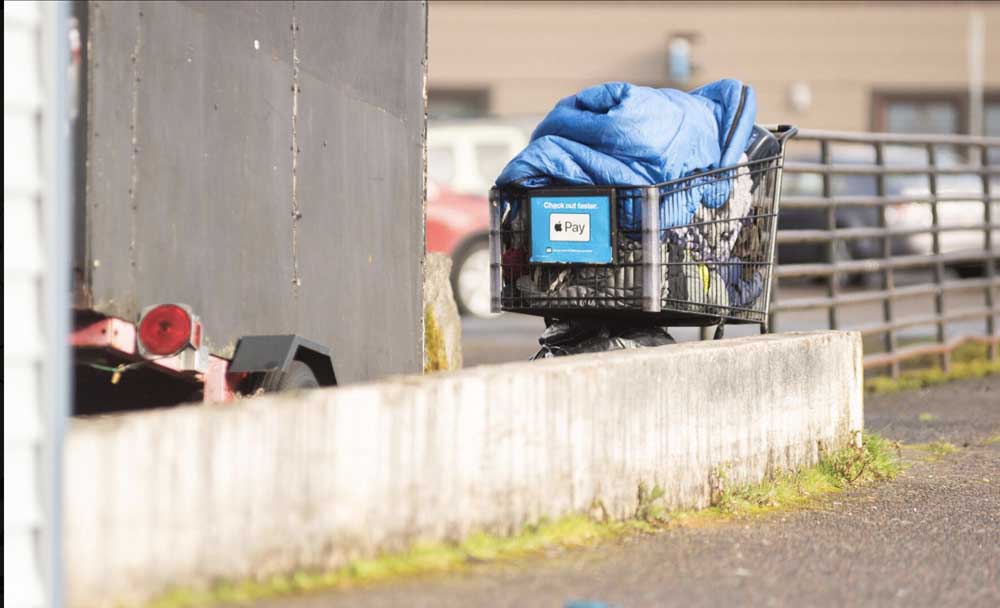Astoria outlines homeless camping ordinance
Published 9:58 am Saturday, May 21, 2022

- Astoria has outlined the time and manner for homeless camping.
The Astoria City Council expects to move forward with a homeless camping ordinance in the coming weeks that would outline the time and manner for when someone can sleep on public property.
A separate resolution would detail places within city limits people can camp.
The ordinance is in response to federal court rulings and state legislation that prohibit police from enforcing illegal camping on public property unless there are adequate shelter spaces available for people to sleep.
Jurisdictions without adequate shelter space, like Astoria, can detail the time, place and manner someone can sleep outdoors.
During a City Council meeting, former Police Chief Geoff Spalding, who is completing projects for the police department on a temporary basis, detailed the proposed time and manner elements. He also presented an approach to identifying places.
Longer process
The city proposed allowing people to set up temporary camps overnight from 9 p.m. to 7 a.m. People will be allowed to have bedrolls, sleeping bags and tents, but will have to take down the shelters and leave by 7 a.m.
Identifying the places people can sleep is expected to be a longer process.
The city proposed identifying areas where people cannot sleep, which leaves everywhere else on the table, with certain exceptions, which will be approved by the City Council.
The city plans to exclude camping from all city parks, city owned and maintained parking lots, public restrooms and primary residential zones. Sidewalks will also be off-limits unless there is enough room to leave 6 feet of space.
That means people would be allowed to sleep in rights of way, such as sidewalks, in commercial districts and some other publicly owned properties in commercial and industrial zones that permit residential uses.
The city is preparing a map that will be adopted by the City Council that people can use to identify where they can sleep. The City Council reviewed a sample of what that map may look like during the meeting Monday.
The city plans to include provisions such as no camping within 6 feet of a doorway and add buffers around excluded areas and doorways.
The City Council may permit camping in certain locations within the excluded areas. For example, the council may designate a park where the city can work with a social service agency to allow an organized, maintained camp.
There are also plans to allow private property owners to help with camping. Churches, for example, could allow people and vehicles to sleep in their parking lots after notifying the city. Homeowners could allow a tent in their backyard or one vehicle in their driveway.
The city plans to include some safeguards in the ordinance to address potential issues that may arise.
The city is also talking with Clatsop Community Action about adding storage lockers for people to store their items.
City councilors were supportive of the additional exclusions and the proposed path moving forward.
Mayor Bruce Jones said that even with the potential exclusions, there are still many public places for people to camp.
“I think it’s a huge leap forward,” Jones said. “It provides plenty of opportunity for us to be in compliance with the court rulings and the law, but also offers our fellow citizens in Astoria a substantial relief from some of what they have seen over the past few years in terms of camping everywhere in ways that people feel uncomfortable with.”
‘So much a Band-Aid’
While City Councilor Roger Rocka supported the rest of council’s consensus, he expressed concerns that the plan stopped short of what the city should do. He said he would like to see the city find a property where people can stay, leave their things, access restroom facilities and even bus service.
“That’s the kind of solution I want to see for our city,” Rocka said. “Not something that’s piecemealed, and so much a Band-Aid, however well-intentioned. And I know a lot of work has gone into this so I feel terrible saying it’s not good enough, but it’s not good enough. Those are human beings out there.”
Chad Jacobs, an attorney assisting the city with the issue, said the ordinance is a first step that allows the city to comply with the new laws.
“It is not a solution to homelessness,” Jacobs said. “It is one tool in the toolbox, and I fully expect that this City Council and other city councils across the state and throughout the entire Ninth Circuit (Court of Appeals) are going to be looking at additional steps to take to reach a point where there possibly are designated campsites. There are situations where they’re building tiny homes and other sorts of resources to provide a more humane process.
“So to the extent it’s possible, I think it’s important to think of this as the first step of many steps to go. And you will make some certain policy decisions as you go down that road as to how many steps you want to take. And every jurisdiction is going through that at the same time.”
Seaside recently approved an ordinance prohibiting camping at all public parks, public parking lots, restrooms, publicly owned properties within residential zoning districts, along U.S. Highway 101 and other areas.
The city has not designated places people can camp, but moved forward with requiring overnight camping permits — from 8 p.m. to 8 a.m. — that would have to be renewed every three weeks. Since the approving the ordinance in late April, the city has already begun making amendments.
“It’s anticipated that once a city passes an ordinance, that they’re probably going to have to be amendments as we go along, as case laws refine, as things are changed,” Astoria City Manager Brett Estes said. “I think this is going to be an iterative process as we start learning how this this is interpreted over time.”





